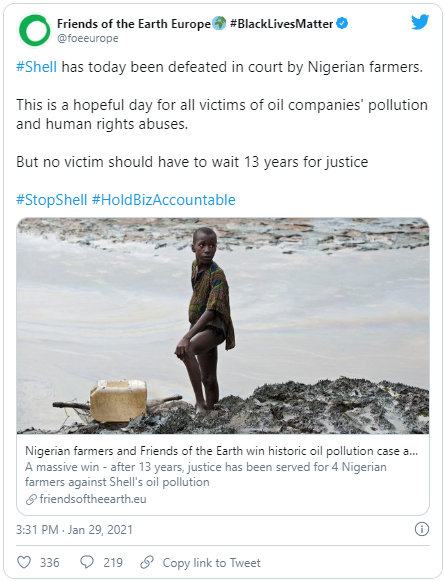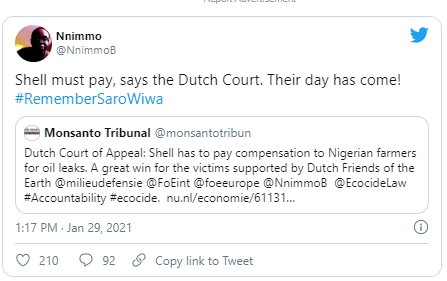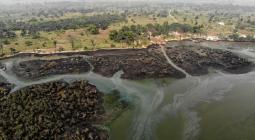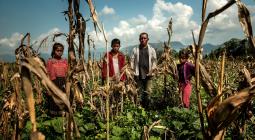Dutch Court Orders Shell Oil to Pay for Harm Done to Nigerian Farmers.

Global environmental justice campaigners heralded a Dutch court's ruling Friday that Royal Dutch Shell's Nigerian subsidiary must pay punitive restitution to Nigerian villages for oil spill contamination that brought death, illness, and destruction to Nigerian farmers and communities.
"After 13 years, justice!" tweeted Friends of the Earth Europe.
The legal effort seeking accountability for the oil pollution in the Niger Delta, as Agence France-Presse noted, was brought forth by the Netherlands branch of Friends of the Earth, and "has dragged on so long that two of the Nigerian farmers have died since it was first filed in 2008."

One of those farmers was the father of Eric Dooh.
"Finally, there is some justice for the Nigerian people suffering the consequences of Shell's oil," Dooh, who became a plaintiff in the case, said in a statement.
"It is a bittersweet victory," he continued, "since two of the plaintiffs, including my father, did not live to see the end of this trial. But this verdict brings hope for the future of the people in the Niger Delta."
As Reuters reported,
Friday's decision went a step further than a 2013 ruling by a lower court, saying that Shell's Nigerian subsidiary was responsible for multiple cases of oil pollution.
The appeals judge sided with the farmers in four of six spills covered by the lawsuit and postponed a verdict in the remaining cases, where the lower court had previously found SPDC responsible.
The appeals court "also held the Anglo-Dutch parent company Royal Dutch Shell liable for installing new pipeline equipment to prevent further devastating spills in the Niger Delta region," AFP added.
The devastation, as Friends of the Earth International (FOEI) has previously described, has been vast:
Between 1976 and 1991, over two million barrels of oil polluted Ogoniland in 2,976 separate oil spills. While oil production has ceased, pipelines operated by Shell still traverse the land, creeks and waterways. Leakages—caused by corroded pipelines as well as bandits—mean that the area is still plagued by oil spills.
It is a painful example of corporate impunity that even when the tireless work of communities, individuals, and campaigners achieves some semblance of justice, it is rarely seen through. And nowhere is this more true than for the Ogoni people in the Niger Delta. As Michael Karikpo, from Environmental Rights Action explained to us: "The price for docility in our communities and country is the loss of liberty and sovereignty to rapacious and predatory multinational oil companies like Shell. Our communities must stand up and continuously demand accountability from Shell and the international system that nurtures it."
Describing the scene in 2019 at a few of the sites affected by oil spills in the Niger Delta, FOEI added that the "horror of the vast stretch of black, lifeless landscape stretching out in front of us is something that has to be seen in order to be believed."
Nigerian environmental justice advocate Nnimmo Bassey, in a tweet welcoming the new ruling, drew attention to the late Ken Saro-Wiwa, who, along with other Ogoni rights activists, was executed by the country's military in 1995 after leading an uprising against Shell's ecological damage in the region.

According to Donald Pols, director of Milieudefensie/Friends of the Earth Netherlands, Friday's ruling represents "fantastic news." He called it "enormous that Shell has to compensate for the damage."
"This is also a warning for all Dutch transnational corporations involved in injustice worldwide," Pols continued. "Victims of environmental pollution, land grabbing, or exploitation now have a better chance to win a legal battle against the companies involved. People in developing countries are no longer without rights in the face of transnational corporations."
Shell, for its part, said it was "disappointed" in the ruling and blamed "sabotage" for the oil spills in question.
1 February 2021
EcoWatch




